- Home
- Michael Dobbs
The Final Cut fu-3 Page 5
The Final Cut fu-3 Read online
Page 5
Urquhart spun round to face his wife. 'Of course he was useless. Utterly and comprehensively useless. I'm surprised they could even tell when his brain had stopped functioning. But that's not the point, is it?' 'Then what is the point, Francis?'
'The point, Elizabeth, is that he was the only surviving member of my original Cabinet from all those years ago. They'll say it's the end of an era. My era. Don't you see?'
Elizabeth had begun taking off her jewellery, methodically preparing herself for bed in the semi-light while she considered her husband's fragile mood. 'Don't you think you're over-reacting a little?' she ventured.
'Of course I am,' he replied. 'But they'll over-react, too, the wretched media always do. You know how the poison has begun to drip. Should've retired on his tenth anniversary. An ageing administration in need of new ideas and new blood. An age which is passing. Now with bloody Freddie away they'll say it's passed. Gone.' He sat down on the edge of his bed. 'It makes me feel so… alone, somehow. Except for you.'
She knelt on his bed and began to work away at the tension in his shoulders. 'Francis, you are the most successful Prime Minister this country has ever had. You've won as many elections as anyone, in three months' time you will have passed Margaret Thatcher's record of time in office. Your place in the history books is assured.'
He turned. She could see the jaw muscles working away, making his temples throb.
'That's it, Elizabeth. I feel as if I'm already history. All yesterday, no longer today. No tomorrow.'
It was back, his black mood, when he raged at the pointlessness of his life and the ingratitude and incompetence of the world around him. The moods never lasted long, but undeniably they were lasting longer. The challenge had lost its freshness, he needed dragons to slay but instead they seemed to have crawled away and hidden between the sub-clauses of interminable policy documents and Euro-regulations. The cloak of office hung heavily on his shoulders, ceremonial robes where once there had been armour. He had towered like a giant above the parliamentary scene, quite beyond the reach of his foes, but something had changed, perhaps in him and certainly in others. They speculated openly about how long he would last before he stepped down, about who would be the most likely successor. His reputation for slicing through the legs of young pretenders was formidable, but now they seemed to have formed a circle around his campfire, skulking in the shadows, staying just beyond his reach, finding safety in growing numbers while they waited for their moment to step into the light. A few weeks ago he had appeared in the Chamber at Question Time, ready as always to defend himself against their arrows, carrying with pride the shield that bore the dents and scars of so many successful parliamentary battles. Then a young Opposition backbencher whom Urquhart scarcely recognized had risen to his feet.
'Does the Prime Minister know the latest unemployment figure for this country?' And sat down.
Impudence! Not 'Will he comment on' or 'How can he excuse', but 'Does he know'. Of course Urquhart knew, two million or other, but he realized he needed not an approximation but the precise figure and had searched in his briefing notes. He shouldn't have needed to search; he should have known. But the damned figure changed every month! And as he had searched, his glasses slipped, and the Opposition benches had erupted as he scrabbled. 'He doesn't know, doesn't care!' they shouted. He had found the answer but by then it was too late. A direct hit.
It was unlike Francis Urquhart. He had bled, shown he was mortal. And the black moods had increased.
'I sometimes wonder what it's all been for, Elizabeth. What you and I have to look forward to. One day we'll walk out through that door for the last time and… then what? Horlicks and bloody Bognor?' He shivered as her fingers reached the knot at the back of his neck.
'You're being silly,' she scolded. 'That's a long way off and, anyway, we've discussed it many times before. There's the Urquhart Library to establish. And the Urquhart Chair of International Studies at Oxford. There's so much we will still have to do. And I met a publisher at the reception this evening. He was enthusing about your memoirs. Said the Thatcher books went for something like three million pounds and yours will be worth far more. Not a bad way to start raising the endowment money we need for the Library.'
His chin had fallen onto his chest once more. She realized the talk of memoirs had been misjudged.
'I'm not sure. Not memoirs, I don't think I can, Elizabeth.'
'We shall need the money, Francis. As much as we shall need each other.'
He turned sharply to look at her, staring intensely. In the dark she couldn't detect whether the cast in his eye betrayed mirth or yet deeper melancholy. 'No memoirs,' he repeated. 'Setting down the old falsehoods and inventing new ones. I couldn't write about my colleagues in that way, speaking such ill of the departed. God knows, I uttered lies enough to bury them, I couldn't pursue them beyond the grave. Not at all. Not for a King's ransom.' He paused. 'Could I, Elizabeth?' Hakim was angry. His coffee was cold, his moustache growing white, his talents under-appreciated, his bank unsympathetic, and everyone knew him simply as Hakim. Not Mr Hakim, not Yaman Hakim, not Old Friend and Colleague Hakim. There was a small sign on his office door to that effect, they would carve it on his coffin, 'Hakim the Forgotten'. Then they would forget him, the wife, the kids, the bosses, his bank manager. All of them. Especially his bank manager. He sipped the lukewarm mud in his coffee cup and pursed his lips in disgust. A lifetime's conscientious work and yet all he would have to take with him when the time came to go were his unfulfilled dreams.
He paused to consider. What would he most like to take with him into the afterlife? Young girls? Gold? An air-conditioned Mercedes? The vineyard he had always coveted? Probably young girls, he decided. No, on second thoughts he would take his bank manager. Then they could both burn.
He smiled to himself, then coughed painfully. The damned pollution was getting to his chest again. It was one of the many problems of building a capital city in the armpit of Anatolia where they burnt filthy brown coal and choked the streets with petrol fumes. And they were slowly, remorselessly congesting his lungs. A lifetime's service in order that he could choke to death. And be forgotten.
If he just locked the door from the inside and rotted, would anybody notice? His was a miserable office, even by the unexceptional standards of TNOC, the Turkish National Oil Corporation -shelves crammed with old manuals and reports, walls plastered with charts covered in bizarre patterns, a desk dusted with coffee stains and cigarette ash, the dusty accompaniments of his work as a geo-physicist. For all he knew the office's previous occupant might still be hiding within the bowels of the small document cupboard in the corner – even though this had been Hakim's office for fourteen years.
He turned back to the computer screen and re-examined the seismic cross-sections that had started coming in from the survey. There seemed to be little of interest, everyone knew there was nothing in the seas around Cyprus – TNOC wouldn't have bothered buying in the seismic had Cypriot waters not abutted Turkey's own. All other parts of the Eastern Mediterranean seemed to have oil, not only the Turks but the Libyans, Syrians, Egyptians, even damned Greeks – everyone except little Cyprus, who perhaps needed it more than most. Dry as dust. God's mystery. A desert amidst a sea of black gold. Such is the oil business.
He looked again. They all laughed at him, old Hakim the Forgotten, but he had the patience for the tedious work of analysis, not like these youngsters whose only interest was in football and fu… He stopped. He experienced a strange tingling in his fingers as they hovered over the keyboard, a sensation that he had been here before, or somewhere much like it. A long time ago. Where could it have been? He polished his glasses, giving himself time to remember. These were sedimentary rocks, that was for sure, but sedimentaries bearing oil were like Greeks bearing gifts. Rarely genuine. What type might they be?
Then he understood. He had not only seen it on geological logs, he'd even stuck his hand in the bloody mud. Thirty years ago, as a student at the
Petroleum Institute when they had visited an exploratory well being drilled near the sea border with Cyprus. It had pulled up all the right geological formations, the sandwich of spongy sandstones that in theory might have held a billion barrels of oil but had yielded not a single drop. Now he thought he knew why. One of the seismic lines from the recent survey had been shot up to the site of the dry well and went straight through what was obviously a fault plane, a slippage in the earth's crust that played hell with the geology.
He started coughing again, nerves this time. Somewhere he reckoned he still had a copy of his Petroleum Institute report and its detailed findings from the old well. The document cupboard. The thin metal door squealed in protest as with shaking fingers he began ransacking the contents – no skeleton guarding the pirate's doubloons but ancient treasure nonetheless. It was in his hands, a slim ring-bound document that trembled like leaves in an autumn wind as he turned the pages.
It was all there. The right structures. Traces in the drill cuttings of residual oil. But no accumulation, the raw wealth drained by some unknown action. And the screen yelled at him. 'Fault!'
Without the seismic revealing the fault plane there had been no way thirty years ago to understand why such suitable sandstones had been bone dry. And without detailed knowledge of the sandstones revealed by the well, there was no way to understand from the seismic alone what the structures might portend.
But Hakim the Geophysicist knew, and he was the only soul in the world in a position to know.
The fault plane had fouled up everything. Trashing all the logic. Tilting the geological structures. Draining the sandstones dry.
And Hakim thought he knew where a billion barrels of oil had gone. 'I hate memorial services. The cant. The falseness. The empty phrases and hollow praise. I hate memorial services.'
Urquhart was in one of those humours again. He had stamped impatiently as he had waited at the east door of St Margaret's Church to be escorted by the rector, and his face had been set in stone while walking to his appointed pew, past the acquiescent, nodding faces with their spaniel smiles and synthetic sympathies worn above black ties and scarves. They had thought his countenance denoted sadness, distress at the loss of such a good friend and colleague as Freddie, Baron Warburton, and indeed his emotions were fractured, but not in pity for others.
The turbid mood had begun the previous night when he had opened his red box to discover that his press officer, thinking it might be appropriate, had enclosed a few of old Freddie's obituaries. The bloody fool. Reading that Warburton's passing marked 'the end of an era' and that he had been 'the last of F.U.'s dirty dozen' had done little to enhance the Prime Minister's enthusiasm about either the press or his press officer.
'Can't stand it, Elizabeth. They hound a man into the grave then, soon as he's dead and gone, reach for their sopping tissues and try to prove what a great man he was, how his loss somehow threatens culture, the country, civilization as a whole. The only reason I kept Freddie was because he followed like a lamb. Everybody knew that. But now he's a dead lamb they speak of him as a lion. Not a single mention anywhere that his veins had been swept quite clear of blood by alcohol. Nor of that little tangle in Shepherd Market when two ladies of the night abandoned him without either trousers, wallet or his Downing Street pass.' 'He was loyal, Francis.'
'I had his balls in a vice, Elizabeth, of course he was loyal!' Urquhart brought himself to a sudden halt, closing his eyes. He'd gone too far. He should be used to honouring the dead at Westminster, there had been so many over the years, but such memories only brought out the worst in him. 'Forgive me. That was unnecessary.' 'Forgiven.'
'It's just that… what will they say about me, Elizabeth? When I've gone?'
'That you were the greatest Prime Minister of the century. That you rewrote the record books as well as the law books. And lived a long and contented retirement.'
'I doubt that. How many great leaders have ever truly found contentment in retirement?' She searched for a name, but none came to her.
'I don't want to grow old and bitter, after all this has gone. I just don't have a vision of myself retiring, being replaced. Ever.' He waved a hand at her. 'Oh, I know I'm being pathetic but… retirement for me isn't filled with long summer evenings but endless nights dancing with ghosts. The ghosts of what might have been. And of what once was.' 'I understand.'
'Yes, I know you do. You're the only one who does. I owe you so very much.'
She sat beside him now, in the church of St Margaret's at Westminster, which stood in the lee of the great Abbey, as they listened to the choristers singing a plaintive anthem. Elizabeth's eyes were fixed on the young treble soloist, a boy of perhaps twelve with fair hair falling across his forehead and the tender voice of an angel that filled the church like the rays of a new sun. What a difference it might have made, he considered, if they had been able to have children; it could have touched their lives with a sense of immortality and brought music to their souls. Yet it was not to be. She had bound the wound until it scarred and toughened, never complaining, though he knew the hurt at times cleaved her in two; instead she had invested all her emotional energy in him and his career. Their career, in truth, for without her he could not have succeeded or sustained. For Elizabeth it had been a barren crown, a sacrifice in many manners far deeper than death, and all for him. He owed her everything.
The choir had finished and she looked round at him, a fleeting softness in her eye that he knew brimmed with regret. How much easier retirement would be to contemplate, had they had children. Instead all they would leave behind them were a Library and the fickle judgement of history. Apres moi, hen. Once he had thought that would be enough but, as the years passed and mortality knocked, he was no longer sure.
'Rejoice in the Lord alway: and again I say, Rejoice. Let your moderation be known unto all men…'
Clerical hyperbole and half-truth, a momentary suspension of political life in the pews behind him while piously they honoured death and, like birds of prey, plotted more.
'Finally, brethren, whatsoever things are true, whatsoever things are honest, whatsoever things are just, whatsoever things are pure…'
Men sang such tunes in sleepy ritual then woke to ignore them so blithely. Yet, on the day of reckoning, what would be his own case? He suffered a pang of momentary doubt as ghosts crowded into the shadows of his mind, but then he was clear, as he had always been. That what he had done was not for himself, but for others, for his country. That the affairs of men require sacrifices to be made, and that the sacrifices which he had made had always been motivated by public and national interest. Sacrifice of others, to be sure, sometimes in blood, but had not he and Elizabeth made sacrifices of their own, two lives devoted to one cause in the service of others?
'… that all things may be so ordered and settled by their endeavours, upon the best and surest foundations, that peace and happiness, truth and justice, religion and piety, may be established among us for all generations.'
Crap. Life was like setting sail in a sieve upon a wild and disorderly sea. Most people got sick, many drowned.
'In silence, let us remember Frederick Archibald St John Warburton.'
Best damned way to remember the man. In complete bloody silence. But it was not the way Urquhart intended to go. 'Thy will be done on earth…'
And there he drew the line. No, that was not good enough, never had been good enough for Urquhart. Some men used morality as a crutch, an excuse always the men who failed and achieved nothing. Morality was not the way through the swamp but the swamp itself, waiting to ensnare you, bind your limbs, drag you under. Great empires had not been built or sustained on such poor footings, or the British people protected from the plottings of envious foreigners by prayer. In the end, those who honoured weakness were weak themselves. A great man was judged by how high he climbed, not by how long he could remain on his knees.
When the time came, he would not go in silence, he would depart with so much clamour th
at it would echo through the ages. Francis Urquhart would be master of his own fate. 'Amen.'
Geoffrey Booza-Pitt revealed an unusual degree of self-consciousness as he faced his Prime Minister across the desk of the Downing Street study, hands clasped together, knuckles showing white and a smile seeming painted and fixed. It was not unusual for him to seek a private audience, and within limits Urquhart encouraged it; Geoffrey was a notorious gossip and adept at stealing others' ideas, which he could either claim as his own or abandon with ridicule depending on the reception given to them by his master. He was without personal doubt or hesitation the finest ankle-tapper in the Cabinet, displaying fastidious team loyalty in public while dextrous at sending his colleagues sprawling in front of goal, usually clipping them from the blind side and always with an expression of pained innocence. A useful source of information and amusement for Urquhart, who relished the sport. Urquhart had assumed that Booza-Pitt would be laying the ground for a change of responsibility at the next reshuffle. Geoffrey was a young man constantly on the move; ever since he had kicked open the door of the pen with a series of brilliant pyrotechnic displays at party conference he had proved impossible to pin down to any job or, for those who had memories for such things, to any guiding political principle. But in that he was not unique, and his effervescent energy, which is the hallmark of some slightly undersized men, more than made up for any lack of depth in the eyes of most observers. Geoffrey was going places – he left no listener in any doubt of the fact and such enthusiasm to many is infectious. And it was no secret around Westminster that Geoffrey would welcome a new job. As Transport Secretary for the last two years he had long since grown exasperated with the futility of trying to siphon twentieth-century cars through London's nineteenth-century road system and desperately wanted to escape the gridlock for some new challenge – any new challenge, so long as it came in the form of perceptible promotion. Move on before you grow roots and others grow bored was the Booza-Pitt rule, a creed he followed as much in love as in politics. He'd already scraped through two marriages; his ribald and envious colleagues referred to his Westminster house as the In amp;. Out Club. Geoffrey's response had been to make a dubious virtue of necessity and to eschew further matrimonial entanglement, instead choosing his companions on an a la carte basis from the lengthy menu provided by the women of Westminster. Being single, it merely enhanced the dynamic impression.

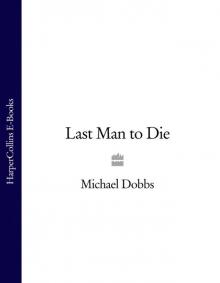 Last Man to Die
Last Man to Die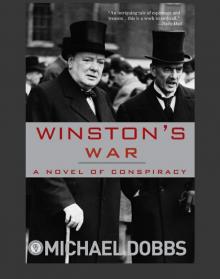 Winston's War
Winston's War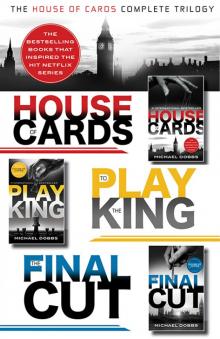 The House of Cards Complete Trilogy
The House of Cards Complete Trilogy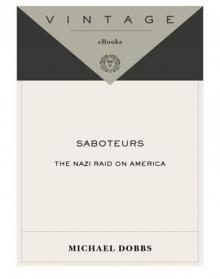 Saboteurs
Saboteurs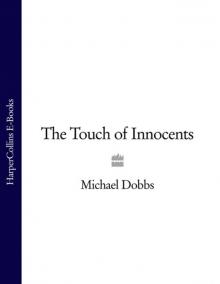 The Touch of Innocents
The Touch of Innocents WC02 - Never Surrender
WC02 - Never Surrender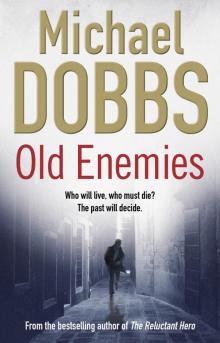 Old Enemies
Old Enemies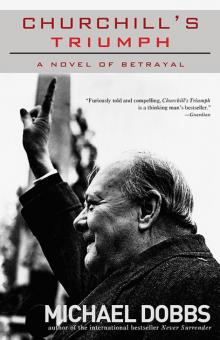 Churchill's Triumph
Churchill's Triumph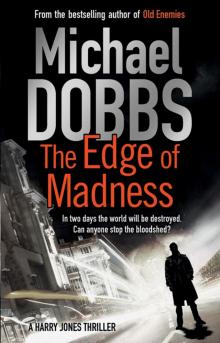 The Edge of Madness
The Edge of Madness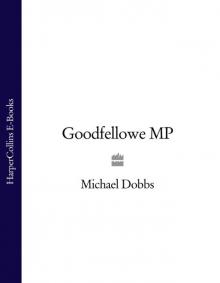 Goodfellowe MP
Goodfellowe MP The Final Cut
The Final Cut Whispers of Betrayal
Whispers of Betrayal Churchill's Hour
Churchill's Hour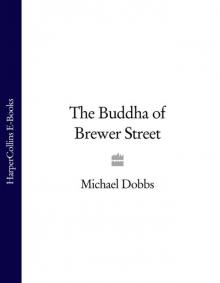 The Buddha of Brewer Street
The Buddha of Brewer Street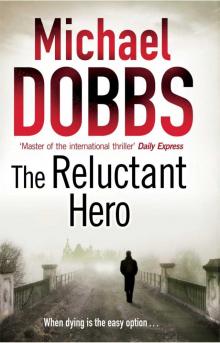 The Reluctant Hero
The Reluctant Hero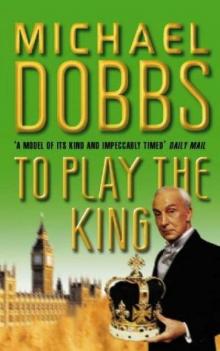 To Play the King
To Play the King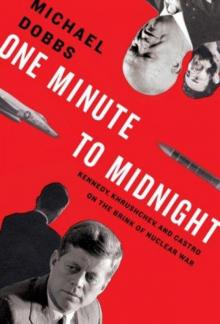 One minute to midnight
One minute to midnight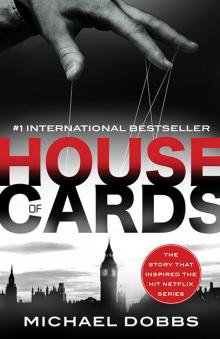 House of Cards
House of Cards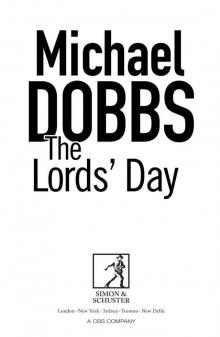 The Lords' Day (retail)
The Lords' Day (retail)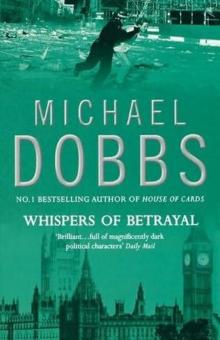 Whispers of betrayal tg-3
Whispers of betrayal tg-3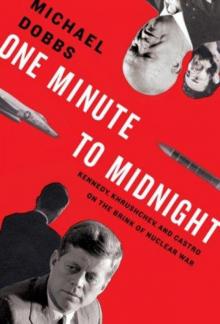 One minute to midnight: Kennedy, Khrushchev, and Castro on the brink of nuclear war
One minute to midnight: Kennedy, Khrushchev, and Castro on the brink of nuclear war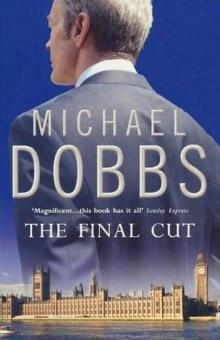 The Final Cut fu-3
The Final Cut fu-3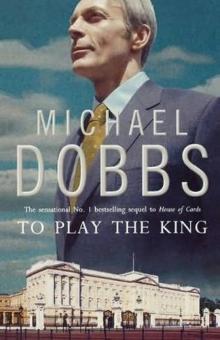 To play the king fu-2
To play the king fu-2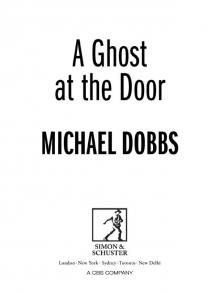 A Ghost at the Door
A Ghost at the Door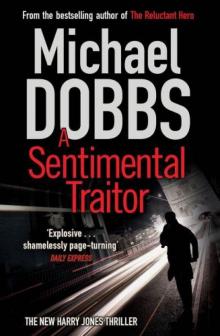 A Sentimental Traitor
A Sentimental Traitor